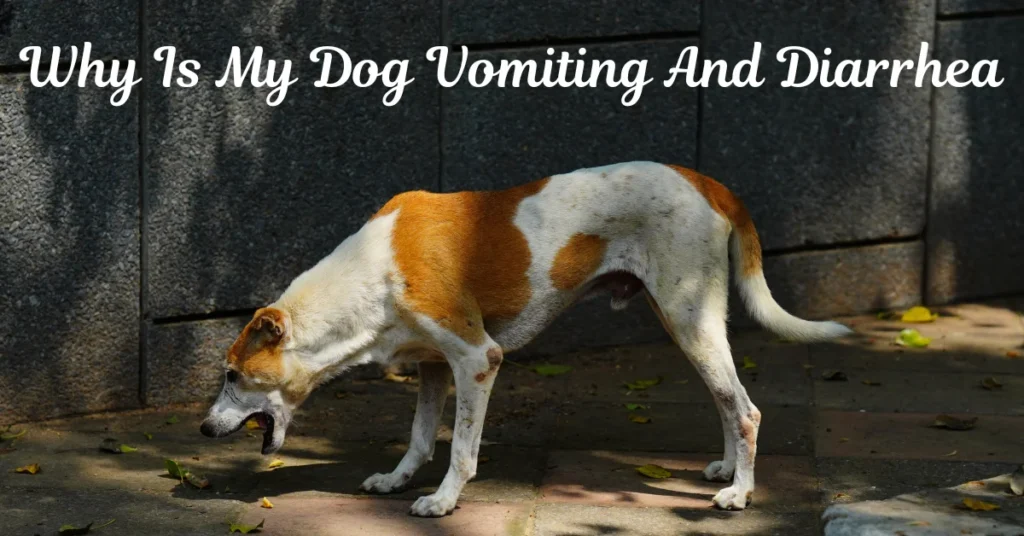It is a very big thing to get worried about Why Is My Dog Vomiting And Diarrhea. These signs usually mean something is wrong with your dog’s stomach or intestines. You must have to know what might be causing these symptoms and when to call the vet is important to keep your dog healthy. This article will help explain why your dog is suffering from Vomiting and Diarrhea and what you can do to help.
Suffering from Diarrhea and Vomiting has a seasonal effect. Whenever the season changes, it can also have some bad impacts on humans and animals. So, Vomiting and Diarrhea can be more bad sometimes due to the condition.
Make sure to visit the vet whenever you observe your dog sick. There are many reasons that indicate why your dog has an upset stomach. Some causes are less serious and do not signs of an underlying health condition.
However, a few reasons could indicate a more serious issue. Especially if your dog has diarrhea and vomiting for more than a day or shows other symptoms. If you are unsure why your dog is sick. It is always best to call your veterinarian.
Here are some possible causes of the dog’s illness. So, let us come and discuss more about it in the given below lines.
1. Reaction of foods:
The reaction of food is the well-known reason behind the situation. The same situation happens with humans when the food reacts badly. If your dog’s diet doesn’t agree with him. He might frequently suffer from an upset stomach. Additionally, an imbalance of bacteria in his gut can also make him ill. Always provide food that is suitable for the dog’s stomach. Do not take the risk of getting dog sick.
2. Intestinal Obstruction:
If your dog has a twisted bowel or another intestinal obstruction. The dog may be suffering from vomit and have runny diarrhea leaking from him. This is a serious condition that requires immediate attention from a veterinarian. The intestinal issue disturbs the dog’s health and can also destroy it. When you feel the dog is suffering from an intestinal issue. Make sure to take your dog to the vet immediately without taking any pause.
3. Inflammatory bowel disease:
If there is inflammation in your dog’s stomach or upper intestine. It can lead to a highly inflamed colon. Diarrhea from this condition may contain blood and mucus. Your dog might also experience abdominal pain and a decreased appetite. Consulting with veterinary care is essential to treat this condition effectively.
4. Suffering from stress and anxiety:
Just like people, when dogs become very stressed or anxious. They can get an upset stomach. Stressful situations at home or ineffective punishment can make your dog anxious. It leads the dog to stomach issues. Reducing stress and providing a calm environment can help prevent these problems. The dogs have almost the same nature as the humans.
5. Any organ failure:
Liver or kidney failure can occur in older dogs or those with liver or kidney disease. One symptom of these conditions is concurrent diarrhea and vomiting. Other serious issues with your dog’s glandular or organ systems, such as pancreatic abnormalities or diabetes, may also present with symptoms of vomiting or diarrhea.
6. Toxic Substances:
The ingestion of toxic substances can be accidental, such as when a dog consumes household chemicals or toxic foods, or intentional. In cases of ingesting certain plants or medications. Regardless of the cause, quick action and professional care are essential for the best chance of recovery.
7. Parasites:
Parasites that protect your dog’s intestines can cause vomiting and diarrhea. Common parasites like whipworms, roundworms, tapeworms, and others can lead to various symptoms. It includes a severely upset gastrointestinal system. Treating your dog for worms often and taking steps to prevent them can keep your dog safe from these bugs.
8. Viruses:
Your dog may experience vomiting or diarrhea due to a viral infection in his intestines. Such as rotavirus or coronavirus. Regular annual wellness checks and vaccinations are important preventive measures to reduce the risk of viral infections and their associated symptoms in dogs. Keeping your dog’s vaccinations up to date is particularly crucial for protecting against these contagious illnesses.
FAQs:
What should I do if my dog has diarrhea and vomiting?
If your pet seems very tired, doesn’t want to eat, or has bloody vomit or diarrhea, take them to the vet right away. If your dog is throwing up or has diarrhea, don’t feed them their next meal. Instead, start giving them bland food.
What medicine can I give my dog for vomiting and diarrhea?
Pepto Bismol can help with symptoms like nausea, heartburn, and an upset stomach in dogs. The usual dosage is 1 teaspoon for every 10 pounds of your dog’s weight. However, if your dog has certain health issues, it’s best to see a vet. The vet might prescribe anti-nausea pills, medications to protect the stomach, or solutions to treat diarrhea.
How to stop a dog from vomiting at home?
Here are some natural remedies that are used to stop dog vomiting at home.
- Electrolyte powder.
- Ice chips.
- Plain rice.
- Baby food.
- Chicken broth.
What can I give my dog to stop diarrhea fast?
Giving your pup a simple diet for 1-2 days can help their tummy. Cook plain white rice with a bit of chicken and add some plain canned pumpkin (not pie filling). This can make your pup feel better. When they are feeling well, slowly go back to their usual food.
Conclusion:
These above all are the possible causes behind the dog’s vomiting and Diarrhea. You must go through them and learn the reasons. When you come to know about the reasons behind. Then you can easily reach the treatment, either to treat at home or consult the vet. You must check the article and get the answer according to your query.
Read It: How To Stop Dog Coughing

